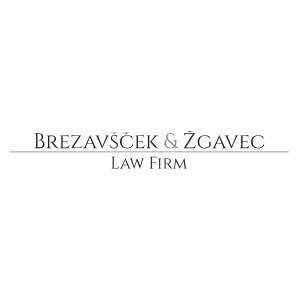Best Business Lawyers in Slovenia
Share your needs with us, get contacted by law firms.
Free. Takes 2 min.
Or refine your search by selecting a city:
List of the best lawyers in Slovenia
About Business Law in Slovenia
Slovenia, strategically located in Central Europe, offers a favorable environment for business due to its stable economy, skilled workforce, and access to the EU market. The country's business laws are influenced by both national legislation and European Union regulations. This legal framework is dynamic and is designed to foster innovation, protect investments, and ensure consumer rights. As a result, business law in Slovenia encompasses a wide range of legal areas, including corporate law, contract law, employment law, and intellectual property law, among others.
Why You May Need a Lawyer
Engaging with business law can be complex, and several situations may necessitate legal assistance in Slovenia:
- Starting a new business and needing guidance on legal structure and compliance requirements.
- Drafting, reviewing, or negotiating contracts with partners, suppliers, or clients.
- Handling mergers, acquisitions, or restructuring of businesses.
- Navigating employment law to manage employees or settle disputes.
- Protecting intellectual property, including trademarks, patents, and copyrights.
- Ensuring compliance with local and EU regulations concerning trade and commerce.
- Resolving disputes through litigation or alternative dispute resolution mechanisms.
Local Laws Overview
In Slovenia, business laws are anchored in a comprehensive set of statutes and codes. Key areas include:
- Company Law: Governs the formation, operation, and dissolution of companies, including requirements for registration with the Slovenian Business Register.
- Contract Law: Regulates agreements made between businesses, ensuring enforceability and adherence to fair practice.
- Employment Law: Covers the rights and obligations of employers and employees in the workplace, emphasizing fair treatment and workplace safety.
- Taxation: Detailed regulations on corporate tax, VAT, and other taxation issues that affect businesses.
- Consumer Protection: Ensures that businesses engage in fair trade practices and prohibits misleading or false advertising.
- Intellectual Property: Protects innovations and creative works, crucial for companies operating in creative industries.
Frequently Asked Questions
What are the steps for registering a business in Slovenia?
To register a business, choose a company name, prepare required documents (including a founding act), register with the Slovenian Business Register, and apply for a tax number.
Can foreigners own a business in Slovenia?
Yes, foreigners can own and operate businesses in Slovenia. They are subject to the same registration and regulatory requirements as domestic business owners.
What types of business entities are available in Slovenia?
Common business entities include sole proprietorships, limited liability companies (d.o.o.), joint-stock companies (d.d.), and partnerships.
What is the corporate tax rate in Slovenia?
The corporate tax rate in Slovenia is 19%, but special tax regimes and incentives may apply to specific sectors or activities.
How are contracts enforced in Slovenia?
Contracts are governed by the Obligations Code, and enforcement can occur through the courts or arbitration, depending on the terms agreed upon by the parties.
What is required for hiring employees in Slovenia?
Employers must comply with labor laws, including the execution of written employment contracts, adherence to minimum wage standards, and ensuring appropriate working conditions.
How can I protect my intellectual property in Slovenia?
Protection can be achieved by registering trademarks, patents, and designs with proper authorities, and enforcing rights through legal action if necessary.
Are there any incentives for foreign investors?
Slovenia offers various incentives such as tax reliefs, subsidies, and funding for research and development to attract foreign investments.
How do I resolve a business dispute in Slovenia?
Disputes can be resolved through negotiation, mediation, or arbitration as alternatives to litigation, which is pursued via the court system.
What are Slovenia's data protection regulations?
Slovenia adheres to the EU General Data Protection Regulation (GDPR), which provides a robust framework for the protection of personal data.
Additional Resources
For more information about business in Slovenia, the following resources and organizations may be helpful:
- Slovenian Chamber of Commerce and Industry
- AJPES - Agency of the Republic of Slovenia for Public Legal Records and Related Services
- SIPO - Slovenian Intellectual Property Office
- MIRS - Market Inspectorate of the Republic of Slovenia
- Ministry of Economic Development and Technology
Next Steps
If you require legal assistance in business matters within Slovenia, consider the following steps:
- Identify the specific area of business law you need help with, such as corporate setup or dispute resolution.
- Research and consult with a qualified business lawyer or law firm with experience in Slovenian business law.
- Prepare all necessary documents and information related to your legal matter before your consultation.
- Consider reaching out to relevant governmental bodies or industry associations for additional support and information.
Lawzana helps you find the best lawyers and law firms in Slovenia through a curated and pre-screened list of qualified legal professionals. Our platform offers rankings and detailed profiles of attorneys and law firms, allowing you to compare based on practice areas, including Business, experience, and client feedback.
Each profile includes a description of the firm's areas of practice, client reviews, team members and partners, year of establishment, spoken languages, office locations, contact information, social media presence, and any published articles or resources. Most firms on our platform speak English and are experienced in both local and international legal matters.
Get a quote from top-rated law firms in Slovenia — quickly, securely, and without unnecessary hassle.
Disclaimer:
The information provided on this page is for general informational purposes only and does not constitute legal advice. While we strive to ensure the accuracy and relevance of the content, legal information may change over time, and interpretations of the law can vary. You should always consult with a qualified legal professional for advice specific to your situation.
We disclaim all liability for actions taken or not taken based on the content of this page. If you believe any information is incorrect or outdated, please contact us, and we will review and update it where appropriate.
Browse business law firms by service in Slovenia
Slovenia Attorneys in related practice areas.
Browse business law firms by city in Slovenia
Refine your search by selecting a city.

















